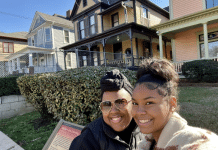
The conversation rings in my ears long after we hang up. My daughter’s principal asked us to return to her school after hours a few moments ago. Apparently, he plans to suspend her for having nicotine on school grounds. He claims there is video footage of a disposable vape falling out of Dawn’s jacket. I know this is impossible and begin visibly shaking, visualizing the verbal thrashing I am going to unleash on him when he realizes his professional blunder.
Warmth creeps up my neck, and my face begins sweating. School zone be damned, I race down the road to my daughter’s middle school. My eighth-grade daughter fidgets in the passenger’s seat, her forehead wrinkling in confusion. Neurodivergent and shy, Dawn whispers, “I didn’t do anything wrong” over and over again.
We walk in and the principal has a smug look on his face as he motions for us to sit down. In a condescending tone, he begins educating me on disposable vapes, telling me their school has been going through an epidemic and that it is mostly shy, Black girls who have been the culprits. My mind raced as I wondered if she picked the vape up somewhere, unaware of what it was.
He points to a slender, hot pink item on his desk and asks, “Is this yours?” Dawn nods quickly. He attempts to play the video, but I stop him. “Dawn,” I say calmly, “Do you have anything to say before this video clip starts?” She shakes her head quickly and reaches over me to grab the item. Yanking the object open, Dawn shakes out dozens of slim pencil lead pieces onto the principal’s desk.
“It’s not a vape,” my sweet girl says quietly. Threatening to call every local media outlet and escalate the situation to the highest of heights, I drag Dawn out of there before the principal can say a word. Our car ride home is very silent, and she asks if she can take the next day off as a mental health day. “Of course, baby, “I reply. We’ll call your counselor for an emergency session.
That night, my husband and I contemplated our next steps. Do we really call television stations? We have a large social media presence, so we could go live and publicly expose the situation. Ultimately, we realized that we really want an apology for our child and accountability for the administrative team’s hasty actions.
Two days later, the principal apologizes to Dawn, head in hand. He admits fault in the school’s investigative protocols and excuses his action by stating that the item was found after school. According to him, there would typically be conversations with the student and a more thorough inquiry. I curtly mutter, “I’m glad you could muster up some authentic regret,” and leave the school.
Now I’m angry with myself for not saying more. Why didn’t I mention the emotional disturbance my neurodivergent child experienced? Why didn’t I tell him she couldn’t sleep all night, fixating on the possibility of going to juvenile hall?
Dawn wasn’t given the benefit of the doubt because of her skin color. She knows it. I know it. What do we do with this information?
I should’ve called her principal out for racially profiling. He didn’t second guess it or investigate more because she’s Black and quiet? Did he actually say that to me? Of course, he did, and I said nothing back. I’m disgusted with myself.
Every Black person in America has the moment when they realize they are different. They understand that some people will judge them because of their skin color. That moment happened to me when I was ten. I wanted more time and maturity before it happened to Dawn. I prayed for a longer stretch of innocence. Now I’m just driving home feeling inadequate.
As if the universe is talking to me, Beyonce’s song, Protector, sweetly seeps through my car speakers. The song lyrics wash over me, “I feel proud of who I am because you need me. I will be your protector, lifting you up so you will be raised.” For as long as I could, I protected Dawn from racism. Now, it’s time to help her heal from this racial trauma and the immense harm to her psyche.
Trauma, whether experienced directly or vicariously, has negative effects on one’s psychological well-being. If you or someone you know is experiencing the impact of discrimination and racism, you can call Counseling and Psychological Services (CAPS) 24/7 at (855) 531-0761 to talk to a professional counselor for emotional support.








